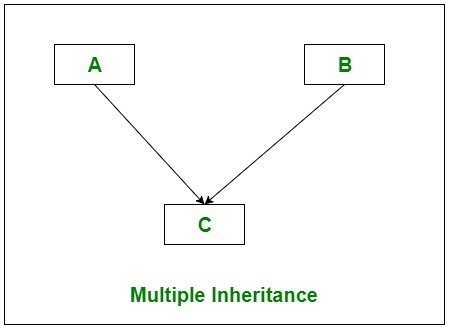We all know that in X++, a class can only extend one class; multiple inheritance is not supported in X++ and to overcome that we can use Interfaces. What I never saw is an example of multiple inheritance in X++. Instead I saw someone saying it’s a bug! I don’t know if was serious or a was making a joke…
Let’s start making things clear:
In Multiple inheritance, one class can have more than one superclass and inherit features from all its parent classes. As shown in the below diagram, class C inherits the features of class A and B.

Most recent languages like C# support only simple inheritance. They don't have multiple inheritance because their designers had to choose between have it in and have all the problems it comes with, or get it out of the language putting away all those problems, and introduce a versatile and less problematic substitute like interfaces and interface inheritance.
Multiple inheritance has a pathological problem:
Imagine, we want to have a class Child which inherits from Parent classes ParentA and ParentB. Both classes have the same methods MethodA and MethodB.
Now, when we instantiate the Class Child then calling MethodA will confuse the compiler that does not know from which class MethodA should be called.
The traditional way to emulate multiple inheritance with interface inheritance.
Let us see how to simulate multiple Inheritance in X++
first we create the interfaces
interface EF_IMultipleInheritaceBaseClass1
{
}
public void x()
{
}
public void y()
{
}
interface EF_IMultipleInheritaceBaseClass2
{
}
public void z()
{
}
next we can create two classes that implement those interfaces
class EF_MultipleInheritaceBaseClass1 implements EF_IMultipleInheritaceBaseClass1
{
}
public void x()
{
info(funcName());//it shows the class and method name
}
public void y()
{
info(funcName());
}
class EF_MultipleInheritaceBaseClass2 implements EF_IMultipleInheritaceBaseClass2
{
}
public void z()
{
info(funcName());
}
now we are ready to create our abstract class that implements the two interfaces
abstract class EF_MultipleInheritaceBaseClass1And2 implements EF_IMultipleInheritaceBaseClass1, EF_IMultipleInheritaceBaseClass2
{
EF_IMultipleInheritaceBaseClass1 class1;
EF_IMultipleInheritaceBaseClass2 class2;
}
protected void new()
{
class1 = classFactory.createClass(classNum(EF_MultipleInheritaceBaseClass1));
class2 = classFactory.createClass(classNum(EF_MultipleInheritaceBaseClass2));
}
public void x()
{
class1.x();
}
public void y()
{
class1.y();
}
public void z()
{
class2.z();
}
finally we can extend our abstract class and bingo, we simulated multiple inheritance:
class EF_MultipleInheritaceClass1And2 extends EF_MultipleInheritaceBaseClass1And2
{
}
public static EF_IMultipleInheritaceClass1And2 construct()
{
return new EF_IMultipleInheritaceClass1And2();
}
public static void main(Args _args)
{
EF_IMultipleInheritaceClass1And2 class1And2;
class1And2 = EF_IMultipleInheritaceClass1And2::construct();
class1And2.x();
class1And2.y();
class1And2.z();
}
No comments:
Post a Comment